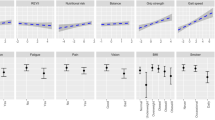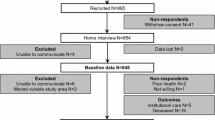Abstract
Objectives
As the psychosocial competence, personal mastery helps individuals to cope with stressful life events, and this study aims to examine impacts of declines in personal mastery on healthy aging among community-dwelling middle-aged and older adults using a nationally representative cohort.
Methods
Data from 648 study participants in the Social Environment and Biomarkers of Aging Study (SEBAS) were retrieved for analysis. All participants were divided into four groups based on their baseline and changes of personal mastery (measured by the Pearlin mastery score) during the 6-year follow-up. Multivariate logistic regression models were adopted to examine associations between declines in personal mastery and indicators for healthy aging (declines in self-perceived mobility, physical function (activities of daily living (ADLs) and instrumental activities of daily living (IADLs)), cognitive function and depressive symptoms).
Results
After adjustments for demographics and comorbidities, those with declines in personal mastery were associated with greater risks of declines in self-perceived mobility (adjusted odds ratio (aOR) 1.50 [95% confidence interval 1.01–2.22], p < 0.05). Although the point estimate in the unadjusted models indicated similar associations between declines in personal mastery and declines in ADLs, IADLs, cognitive function or depressive symptoms, these outcomes did not reach statistical significance in the adjusted model.
Conclusions
Declines in personal mastery were negatively associated with indicators related to healthy aging (particularly locomotion) in a 6-year follow-up. Further investigations are needed to explore the effects of preventing declines in personal mastery in promoting healthy aging over time.

Similar content being viewed by others
Data availability
The Social Environment and Biomarkers of Aging Study of the Taiwan Ministry of Health and Welfare provided the database used in this study. All potentially identifying data were encrypted to protect anonymity. Investigators who receive approval of a proposal and sign a data access agreement can request access to the data by contacting the Inter-University Consortium for Political and Social Research (https://www.icpsr.umich.edu/web/pages/).
References
Chen LK (2022) Urbanization and population aging: converging trends of demographic transitions in modern world. Arch Gerontol Geriatr 101:104709. https://doi.org/10.1016/j.archger.2022.104709
Heckhausen J, Schulz R (1995) A life-span theory of control. Psychol Rev 102:284–304. https://doi.org/10.1037/0033-295x.102.2.284
Rudnicka E, Napierala P, Podfigurna A et al (2020) The world health organization (WHO) approach to healthy ageing. Maturitas 139:6–11. https://doi.org/10.1016/j.maturitas.2020.05.018
National Statistics, R. O. C. T (2021) National statistics bulletin. https://eng.stat.gov.tw/. Accessed 20 Dec 2022
Lin YY, Huang CS (2016) Aging in Taiwan: building a society for active aging and aging in place. Gerontologist 56:176–183. https://doi.org/10.1093/geront/gnv107
Kojima G, Iliffe S, Taniguchi Y et al (2017) Prevalence of frailty in Japan: a systematic review and meta-analysis. J Epidemiol 27:347–353. https://doi.org/10.1016/j.je.2016.09.008
Song P, Tang W (2019) The community-based integrated care system in Japan: health care and nursing care challenges posed by super-aged society. Biosci Trends 13:279–281. https://doi.org/10.5582/bst.2019.01173
Beard JR et al (2016) The World report on ageing and health: a policy framework for healthy ageing. Lancet 387:2145–2154. https://doi.org/10.1016/s0140-6736(15)00516-4
Dent E, Hoogendijk EO (2014) Psychosocial factors modify the association of frailty with adverse outcomes: a prospective study of hospitalised older people. BMC Geriatr 14:108. https://doi.org/10.1186/1471-2318-14-108
Fratiglioni L, Marseglia A, Dekhtyar S (2020) Ageing without dementia: can stimulating psychosocial and lifestyle experiences make a difference? Lancet Neurol 19:533–543. https://doi.org/10.1016/s1474-4422(20)30039-9
Koolhaas W, Van Der Klink JJ, De Boer MR et al (2014) Chronic health conditions and work ability in the ageing workforce: the impact of work conditions, psychosocial factors and perceived health. Int Arch Occup Environ Health 87:433–443. https://doi.org/10.1007/s00420-013-0882-9
Mulasso A, Roppolo M, Giannotta F et al (2016) Associations of frailty and psychosocial factors with autonomy in daily activities: a cross-sectional study in Italian community-dwelling older adults. Clin Interv Aging 11:37–45. https://doi.org/10.2147/CIA.S95162
Pearlin LI, Schooler C (1978) The structure of coping. J Health Soc Behav 19:2–21
Mausbach BT et al (2007) The attenuating effect of personal mastery on the relations between stress and Alzheimer caregiver health: a five-year longitudinal analysis. Aging Ment Health 11:637–644. https://doi.org/10.1080/13607860701787043
Roepke SK, Grant I (2011) Toward a more complete understanding of the effects of personal mastery on cardiometabolic health. Health Psychol 30:615–632. https://doi.org/10.1037/a0023480
Lachman ME, Neupert SD, Agrigoroaei S (2011) Chapter 11 – The relevance of control beliefs for health and aging. In: Schaie KW, Willis SL (eds) Handbook of the Psychology of Aging, 7th edn. Academic Press, San Diego
Ang S, Malhotra R (2016) Association of received social support with depressive symptoms among older males and females in Singapore: Is personal mastery an inconsistent mediator? Soc Sci Med 153:165–173. https://doi.org/10.1016/j.socscimed.2016.02.019
Lee WJ, Chen LK, Peng LN et al (2016) Personal mastery attenuates the adverse effect of frailty on declines in physical function of older people: a 6-year population-based cohort study. Medicine (Baltimore) 95:e4661. https://doi.org/10.1097/md.0000000000004661
Nicolaisen M, Moum T, Thorsen K (2018) Mastery and depressive symptoms: how does mastery influence the impact of stressors from midlife to old age? J Aging Health 30:1084–1107. https://doi.org/10.1177/0898264317705782
Surtees PG, Wainwright NW, Luben R et al (2010) Mastery is associated with cardiovascular disease mortality in men and women at apparently low risk. Health Psychol 29:412–420. https://doi.org/10.1037/a0019432
Gerstorf D, Heckhausen J, Ram N et al (2014) Perceived personal control buffers terminal decline in well-being. Psychol Aging 29:612–625. https://doi.org/10.1037/a0037227
Lachman ME, Agrigoroaei S (2010) Promoting functional health in midlife and old age: long-term protective effects of control beliefs, social support, and physical exercise. PLoS ONE 5:e13297. https://doi.org/10.1371/journal.pone.0013297
Turiano NA, Chapman BP, Agrigoroaei S et al (2014) Perceived control reduces mortality risk at low, not high, education levels. Health Psychol 33:883–890. https://doi.org/10.1037/hea0000022
Cairney J, Krause N (2008) Negative life events and age-related decline in mastery: are older adults more vulnerable to the control-eroding effect of stress? J Gerontol B Psychol Sci Soc Sci 63:S162–S170. https://doi.org/10.1093/geronb/63.3.s162
Health Promotion Administration, M. O. H. & Welfare (2018) Taiwan Longitudinal Study on Aging (TLSA). https://www.hpa.gov.tw/EngPages/Detail.aspx?nodeid=1077&pid=6197; last Accessed 20 Dec, 2022
Cornman JC et al (2016) Cohort profile: the social environment and biomarkers of aging study (SEBAS) in Taiwan. Int J Epidemiol 45:54–63. https://doi.org/10.1093/ije/dyu179
Hsiao FY, Peng LN, Lee WJ et al (2022) Sex-specific impacts of social isolation on loneliness, depressive symptoms, cognitive impairment, and biomarkers: results from the social environment and biomarker of aging study. Arch Gerontol Geriatr 106:104872. https://doi.org/10.1016/j.archger.2022.104872
Lin MH et al (2022) Age and sex differences in associations between self-reported health, physical function, mental function and mortality. Arch Gerontol Geriatr 98:104537. https://doi.org/10.1016/j.archger.2021.104537
Lu WH, Chiou ST, Chen LK et al (2016) Functional and mental health outcomes of the joint effects of spousal health: the potential threats of “Concordant Frailty.” J Am Med Dir Assoc 17:324–330. https://doi.org/10.1016/j.jamda.2016.01.006
Meng LC, Huang ST, Peng LN et al (2022) Biological features of the outcome-based intrinsic capacity composite scores from a population-based cohort study: pas de deux of biological and functional aging. Front Med (Lausanne) 9:851882. https://doi.org/10.3389/fmed.2022.851882
Chen YL, Hsiung PC, Chung L et al (2013) Psychometric properties of the mastery scale-Chinese version: applying classical test theory and Rasch analysis. Scand J Occup Ther 20:404–411. https://doi.org/10.3109/11038128.2013.838999
Pearlin LI, Lieberman MA, Menaghan EG et al (1981) The stress process. J Health Soc Behav 22:337–356
Eklund M, Erlandsson LK, Hagell P (2012) Psychometric properties of a Swedish version of the Pearlin mastery scale in people with mental illness and healthy people. Nord J Psychiatry 66:380–388. https://doi.org/10.3109/08039488.2012.656701
Togari T, Yonekura Y (2015) A Japanese version of the Pearlin and schooler’s sense of mastery scale. Springerplus 4:399. https://doi.org/10.1186/s40064-015-1186-1
Pavlova MK (2021) Do workers accumulate resources during continuous employment and lose them during unemployment, and what does that mean for their subjective well-being? PLoS ONE 16:e0261794. https://doi.org/10.1371/journal.pone.0261794
Hsiao FY, Peng LN, Lee WJ et al (2022) Higher dietary diversity and better healthy aging: a 4-year study of community-dwelling middle-aged and older adults from the Taiwan longitudinal study of aging. Exp Gerontol 168:111929. https://doi.org/10.1016/j.exger.2022.111929
Katz S, Ford AB, Moskowitz RW et al (1963) Studies of illness in the aged. the index of ADL: a standardized measure of biological and psychosocial function. JAMA 185:914–919. https://doi.org/10.1001/jama.1963.03060120024016
Lawton MP, Brody EM (1969) Assessment of older people: self-maintaining and instrumental activities of daily living. Gerontologist 9:179–186
Todd M, Schneper L, Vasunilashorn SM et al (2018) Apolipoprotein E, cognitive function, and cognitive decline among older Taiwanese adults. PLoS ONE 13:e0206118. https://doi.org/10.1371/journal.pone.0206118
Boey KW (1999) Cross-validation of a short form of the CES-D in Chinese elderly. Int J Geriatr Psychiatry 14:608–617. https://doi.org/10.1002/(sici)1099-1166(199908)14:8%3c608::aid-gps991%3e3.0.co;2-z
Moreira MTC, Gomes CS, Pinto JM (2022) Influence of personal mastery on mobility disability among older adults: a systematic review. Arch Gerontol Geriatr 102:104750. https://doi.org/10.1016/j.archger.2022.104750
Milaneschi Y et al (2010) Personal mastery and lower body mobility in community-dwelling older persons: the invecchiare in chianti study. J Am Geriatr Soc 58:98–103. https://doi.org/10.1111/j.1532-5415.2009.02611.x
Sargent-Cox KA, Butterworth P, Anstey KJ (2015) Role of physical activity in the relationship between mastery and functional health. Gerontologist 55:120–131. https://doi.org/10.1093/geront/gnu042
Lee PL (2016) Control beliefs level and change as predictors of subjective memory complaints. Aging Ment Health 20:329–335. https://doi.org/10.1080/13607863.2015.1008991
Lee WJ, Liang CK, Peng LN et al (2017) Protective factors against cognitive decline among community-dwelling middle-aged and older people in Taiwan: A 6-year national population-based study. Geriatr Gerontol Int 17:20–27. https://doi.org/10.1111/ggi.13041
Steunenberg B, Beekman AT, Deeg DJ et al (2007) Mastery and neuroticism predict recovery of depression in later life. Am J Geriatr Psychiatry 15:234–242. https://doi.org/10.1097/01.Jgp.0000236595.98623.62
Raeifar E, Halkett A, Lohman MC et al (2017) The relation between mastery, anticipated stigma and depression among older adults in a primary care setting. J Nerv Ment Dis 205:801–804. https://doi.org/10.1097/NMD.0000000000000686
Reini K, Nyqvist F (2017) Sense of mastery differences between working-age Swedish- and Finnish-speaking Finns: a population-based study. Scand J Public Health 45:404–410. https://doi.org/10.1177/1403494817696183
Funding
This study was supported by the Taiwan National Science and Technology Council (NSTC 112–2622-8-A49-016-IE and NSTC 112–2923-B-A49 -002 -MY2) and the Interdisciplinary Research Center for Healthy Longevity of National Yang Ming Chiao Tung University from The Featured Areas Research Center Program within the framework of the Higher Education Sprout Project by the Ministry of Education (MOE) in Taiwan.
Author information
Authors and Affiliations
Contributions
CS, FYH, and LKC helped design the study. CS analyzed the data and wrote the original draft. FYH, LKC, YCL and HYL contributed to conceptualization and critical revision of the manuscript. All of the authors approved the final version of the work.
Corresponding authors
Ethics declarations
Conflict of interest
The authors declare no conflicts of interest.
Statement of human and animal rights
This study was approved by the Research Ethics Committee of National Taiwan University Hospital (Registration number, 202204025RINA).
Informed consent
For this type of article, informed consent is not needed.
Additional information
Publisher's Note
Springer Nature remains neutral with regard to jurisdictional claims in published maps and institutional affiliations.
Rights and permissions
Springer Nature or its licensor (e.g. a society or other partner) holds exclusive rights to this article under a publishing agreement with the author(s) or other rightsholder(s); author self-archiving of the accepted manuscript version of this article is solely governed by the terms of such publishing agreement and applicable law.
About this article
Cite this article
Shen, C., Lin, YC., Lin, HY. et al. Effects of declines in personal mastery on self-perceived mobility, physical function, cognitive function, and depressive symptoms: a 6-year follow-up study from the Social Environment and Biomarkers of Aging Study. Aging Clin Exp Res 35, 3215–3226 (2023). https://doi.org/10.1007/s40520-023-02613-6
Received:
Accepted:
Published:
Issue Date:
DOI: https://doi.org/10.1007/s40520-023-02613-6




